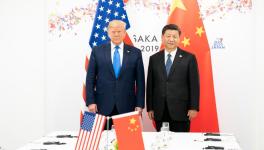Why TRIPS Waiver Proposal is the Need of the Hour Amid Pandemic
Representational use only. Image Source: The Hindu
As the new World Trade Organisation (WTO) Director General assumes office on March 1, 2021, it will be interesting to watch the developments over the next few weeks at the negotiating table of Trade Related Aspects of Intellectual Property Rights (TRIPS) Council where the TRIPS waiver proposal is pending for five months now.
At the WTO, the General Council meeting is scheduled on March 1-2 which has the TRIPS waiver proposal on its agenda and where members will present an oral status and continue discussions on this issue. The formal TRIPS Council meeting is scheduled for March 10.
The WTO Agreement on TRIPS is a multilateral trade agreement, formalised in 1994, which set minimum standards for intellectual property (IP) protection. In order to mitigate the adverse impact of patents, such as high prices, monopoly power to pharmaceutical companies, unequal access to medicines and medical products, TRIPS flexibilities were negotiated as policy spaces for countries and formalised under the Doha Declaration on TRIPS and Public Health in 2001.
However, over the years, the ill effects of TRIPS are for all to see, which reached their pinnacle during the ongoing public health and economic crisis caused by COVID-19 pandemic. There were several reports where intellectual property rights have been hindering timely provisioning of affordable medical products at the cost of lives. Even under a crisis of such magnitude there have been instances all around where pharma companies have resorted to arm twisting of sovereign governments and dictated their profiteering terms.
To counter such practices, on October 2, 2020, India and South Africa had mooted the proposal at the TRIPS Council demanding a temporary waiver of certain TRIPS obligations on copyrights and related rights, industrial designs, patents, and the protection of undisclosed information in relation to the prevention, containment or treatment of Covid-19. Although there has been stiff resistance from developed countries, the proposal has gradually garnered support from other developing and less developed countries.
At present, 57 developing and least-developed countries (LDCs) have co-sponsored the waiver proposal, and 62 countries have strongly supported the waiver proposal. The developed countries such as the United States, the European Union, the United Kingdom, Japan, Canada, Switzerland, Norway, Singapore and Australia continue to oppose the proposal, while Chile, China and Colombia have stressed on the need for more evidence-based discussions.
The waiver proposal has gathered support from other quarters as well. On February 24, there was a Declaration from Members of the European Parliament to urge the Commission and Member States not to block the TRIPS waiver at the WTO and to support global access to COVID-19 vaccines.
There are 116 Parliamentarians from across party lines who are signatories to this declaration underlining that “… (EU) must ensure that it promotes a genuine multilateral system of solidarity, supporting all countries to respond efficiently to the pandemic.” and “to enable their local production capacities and increase their access to COVID-19 treatments.”
The civil society organisations in a number of countries have also intensified their efforts to garner support of the proposal. The World Health Organisation, led by Tedros Ghebreysus, has repeatedly warned against vaccine nationalism, with world being on the brink of “catastrophic moral failure”.
In a statement made at the Special Session of the WTO General Council on February 13, the Director-General elect Ngozi Okonjo-Iweala called on WTO members to “reject vaccine nationalism and protectionism” and to “intensify cooperation on promising new vaccines, therapeutics, and diagnostics” She spoke of a Third Way “to broaden access through facilitating technology transfer within the framework of multilateral rules, so as to encourage research and innovation while at the same time allowing licensing agreements that help scale up manufacturing of medical products”.
Although this initial statement appears to be striking the right chords while looking in terms of the stalemate over the waiver proposal, it must be borne in mind that Okonjo-Iweala has earlier served as the chair of the board of GAVI, the Vaccine Alliance.
GAVI’s role has been subject to criticism and its approach has been termed as one which promotes a market-driven vision that includes protection of IPRs and market-based pricing mechanisms (Global Health Watch 5, 2018).
Experts read the statement by the new WTO DG in the light of this. K M Gopakumar, an expert on trade and policy issues and working as legal advisor for the Third World Network, opines that “the Third Way suggested by the new DG hints at giving voluntary license to the companies which gives monopoly power to these companies to determine the rules of the game. This is not an effective tool to promote affordable access to vaccines and other medical products and, thus, should be rejected”.
The TRIPS waiver proposal acquires all the more significance in the backdrop of the latest revelations in a report by the Bureau of Investigative Journalism last week. Pfizer has reportedly been accused of “bullying” Latin American governments to acquire its COVID-19 vaccine. It is alleged that Pfizer has even asked some countries to put up sovereign assets, such as embassy buildings and military bases, as a guarantee against the cost of any future legal cases.
The report also pointed out Pfizer demanded more than the usual indemnity against civil claims filed by citizens suffering serious adverse events after inoculation; it insisted that “the governments cover the potential costs of civil cases brought as a result of Pfizer’s own acts of negligence, fraud, or malice.” Apparently the negotiations with Argentina eventually broke down due to these unwarranted demands and attempts to force changes in the national laws.
With this incident coming to light, the tactics of Big Pharma have hit a new low. Even in the times of a pandemic, where each passing day means loss of lives, the pharmaceutical companies are trying to suck out as much profit as possible. The WHO Director General has been criticising the bilateral deals between rich countries and pharmaceutical companies, which are driving the prices up and also delaying the availability of vaccines in the poorer countries.
With the initial budget estimate of $38.1 billion in September 2020 for the ACT Accelerator to accelerate the development and equitable distribution of COVID-19 vaccines, diagnostics and therapeutics, the funding gap for 2021 still remains at $ 22.2 billion as on February 26, 2021. As a result of the funding gap, as well as the usurping of bulk of the vaccine supplies by a few rich countries, the rollout of vaccines to poorer countries through the vaccine arm of the ACT Accelerator (COVAX) has been rather slow. It was only on February 23 that the first batch of AstraZeneca/ Oxford vaccine was shipped through COVAX facility from the Serum Institute in India to Ghana. Meanwhile, many other poorer countries, such as Somalia, some of which are witnessing a resurgence of COVID-19 cases and have fragile health systems, still wait for their supplies.
In such times, when base attempts by pharmaceutical companies at making profits are surfacing, when rich countries are cornering the vaccine supplies, when there is complete disregard of the considerations of equitable and affordable distribution of life-saving vaccines and when clearly there is a stark contrast in terms of avoidable deaths between poorer and richer countries, the TRIPS waiver proposal, which only asks for a temporary waiver, becomes the need of the hour.
Get the latest reports & analysis with people's perspective on Protests, movements & deep analytical videos, discussions of the current affairs in your Telegram app. Subscribe to NewsClick's Telegram channel & get Real-Time updates on stories, as they get published on our website.
























